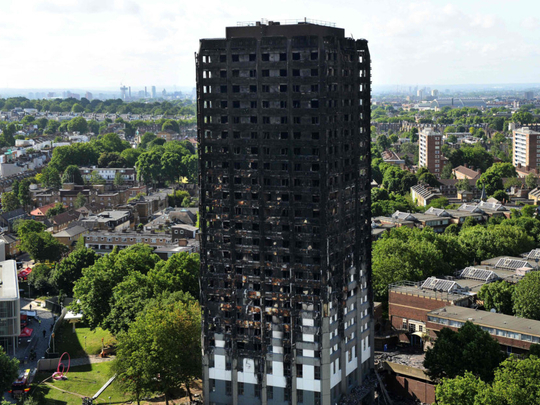
This is a terrible time for Britain. It is not a time for opportunism and propaganda. Yet, still the Daily Mail has attempted to suggest that environmental targets may have played a part in the Grenfell Tower inferno. The Daily Express has gone one better, suggesting that “EU regulations” that “set out rules for buildings’ energy consumption” may have forced the redevelopers into using cheap, flammable cladding.
Of course these are pathetic statements, gross in their partiality. We know that fire-safe cladding was available. The idea of being energy efficient and safe was not impossible, or even undesirable in theory. But fire-resistent cladding would have raised the cost for the whole building by an estimated £5,000 (Dh23,476). That sum may be what people died for.
It’s clear to me that these arguments were dreamed up by people seeking new ways to pursue pet hates, however appalling the situation. Yet, there is every likelihood that those same people believe it is they who offer an outpost of sanity amid the hysteria. Racists who have mocked the dead on social media are likely to see themselves as boldly telling truths other won’t express.
Anti-environmentalists, diehard Brexiters, even racists — they all think they’re right, and they are all angry. They see those of us who blame poverty, inequality, hostility against social housing and the worship of the fast buck as being every bit as deluded as we see them. That’s the problem and it’s amplified now. Anger doesn’t help people to listen. It divides us all further. There is so much anger in the wake of the horror of Grenfell Tower that it feels controversial to ask whether anger unbridled is a helpful reaction. Much of it is clearly a righteous anger, not least that was seen on Friday when protesters marched on Kensington Town Hall and some entered the building. But it invites the response that, until now, people haven’t been angry enough. Yet, in recent decades anger has become riot in Britain many, many times.
Once anger is unleashed, it is hard to contain. Once it is contained, however, it tends to stay that way, for a time at least. Britain is already a very angry and divided nation. At this moment, when a terrible and completely avoidable disaster has struck, it is a nation that does not even have a functioning government. People are angry with Prime Minister Theresa May, and she has good reason to be wary of them. She knows how angry people have a right to be, and fears facing them. Yet, those who pillory her for her fear tend to do so in bad faith, glad that she has shown her inadequacy, eager to emphasise it further and get people yet more furious.
This is how anger breeds anger. No one is taking command of the anger at the foot of Grenfell Tower, which becomes another thing to be angry about, which makes the likelihood of command being taken even more slender. Meanwhile, former chancellor of the exchequer, George Osborne, one of the creators of the mess all of Britain is in now, is using his new position as editor of the London Evening Standard to taunt his former colleagues: ‘Get a grip’, the headline on his newspaper shouted out from a photograph of a building that still has bodies in it. Like this is a game.
Some people have suggested the Grenfell Tower disaster “should not be politicised”. That’s a nonsensical statement. The provision of social housing is political, as was the decision to remove its management from local authorities whenever possible. But I do think there is merit in considering whether this highly emotional situation should be further emotionalised. Politics, after all, is about managing or increasing power. Emotions are about expressing how you feel. Politicians are falling over themselves to tell survivors they understand their anger. What they need to understand is their arguments. They need to understand exactly why they let people down as badly as it was possible to let them down.
The government, such as it is, needs to take full responsibility, because without full responsibility, the need to blame roams savagely and the desire to avoid blame rears up. Any manufacturer who has supplied this horrifically dangerous material or something similar, and any contractor who has fitted it, must come forward right away. They should not hang back for fear of public anger. They must do the right thing. There must, for all our sakes, be an atmosphere in which they feel able to do that. Money must be made available so that this appalling, corner-cutting mistake can be rectified within the shortest space of time.
The first priority is providing safety, security and support for the survivors who lost their homes, their family members and neighbours. The second is removing the fear of people around Britain that their building may be next. The third, though, is replacing anger with resolve and a genuine commitment to create a Britain where a safe, decent home is a right, not a luxury. On this matter, from both the major political parties, there has been nothing but excuses and deceit, but even the most evasive must see that the normal responses won’t do this time.
Never again, they’ll say. We need to make that a reality, and we can’t let sheer anger get in the way.
— Guardian News & Media Ltd
Deborah Orr is one of Britain’s leading social and political commentators. She has a weekly column in the Guardian.








